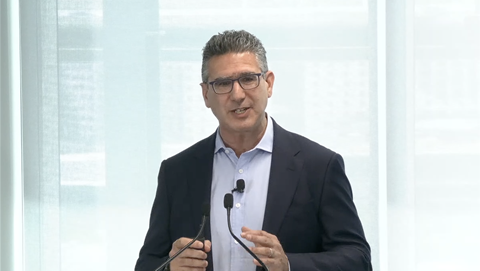Jockeying between Australia’s retail banks for new ground in smartphone payments has gone into overdrive after Westpac revealed it will port Apple’s Siri voice service to transactional accounts for person-to-person payments within days.

Westpac said on Wednesday the new service will enable Siri initiated person-to-person payments and account balance checks that bypass conventional typed passwords and passcodes and replace them either with Apple’s facial recognition or Touch ID.
While the porting of so-called ‘pay-anyone’ functionality to Siri is an incremental shift in terms of user experience, the bigger underlying push by the bank is a gradual move away from alphanumeric passwords.
The clunky passcodes are gradually being dumped in favour of biometric authentication to combat escalating fraud, a shift certain to come to other platforms.
Westpac said its own research indicated 48 percent of Australians now use a voice assistant on their phones. Of that group, a third use it at least once a day.
The bank also cited recent survey results where “28 percent of Australians identified not having their bank login details to hand as one of the biggest roadblocks to transferring money via mobile, while the biggest benefits were being able to transfer money quickly (25 percent) and on-the-go (17 percent).”
Those numbers appear to indicate a kind of ‘use it or lose it’ approach by Westpac to catering everyday transactions to voice services as Google's assistant, Amazon's Alexa and Microsoft’s Cortana also gain ground and are increasingly backed by AI.
Being seen to be first is clearly regarded as a differentiator by the head of Westpac’s consumer bank, George Frazis.
“Westpac customers will be the first in Australia to have the choice and convenience of using Siri voice technology to make a payment, and also check their account balance,” Frazis said.
“With more than 2.5 million customers using mobile banking, this is part of our continued strategy of providing our customers with the technology and tools to meet their financial needs.”
The thinking in many banks is that as Open Banking increasingly takes hold, consumers will be increasingly agnostic to bank brands as opposed to the transactions they want to perform – be they bill payments, person to person transactions or ordering pizza.
There's also the imperative to be seen to be innovating, even if additions like Siri are incremental and use what will soon be legacy technology.
Westpac has confirmed the Siri service will still use the ageing BSB system (bank-state-branch) based on bilateral links between banks rather than running across the New Payments Platform that uses real-time clearing.
That means that while Westpac customers will be able to get cleared from Westpac customers immediately – but it’s not entirely clear how long direct transfers to other accounts will take to be available. In some cases that could be days, especially if the payments are made on a weekend or long weekend.
Merchants have long grizzled about banks ‘sitting on the float’ over weekends under the T+2 system (transaction + 2 days to clear), a key reason the Reserve Bank pushed relentlessly for the NPP.
Still to be confirmed is if there will be a hard ceiling on the size of transactions, especially when amounts more than $10,000 automatically trip an AUSTRAC flag.
Also a little unclear is whether merchant or biller payments will be roped into Westpac’s Siri foray, especially as BPAY (which Westpac is a stakeholder in) heavily promotes its new Osko NPP overlay service.
BPAY will launch two new services, Sypht and Lodge, later today.
Westpac said its 'Travel Companion' mobile banking app will be extend from Android to iPhone users.
At the same time 'Westpac for iMessage' will get a new ‘You Owe Me’ feature allows customers to more easily provide a specific amount owed to them when sharing their account details via iMessage."


_(23).jpg&h=140&w=231&c=1&s=0)


_(36).jpg&h=140&w=231&c=1&s=0)





 iTnews Executive Retreat - Security Leaders Edition
iTnews Executive Retreat - Security Leaders Edition
 iTnews Cloud Covered Breakfast Summit
iTnews Cloud Covered Breakfast Summit
 The 2026 iAwards
The 2026 iAwards












_(1).jpg&h=140&w=231&c=1&s=0)



